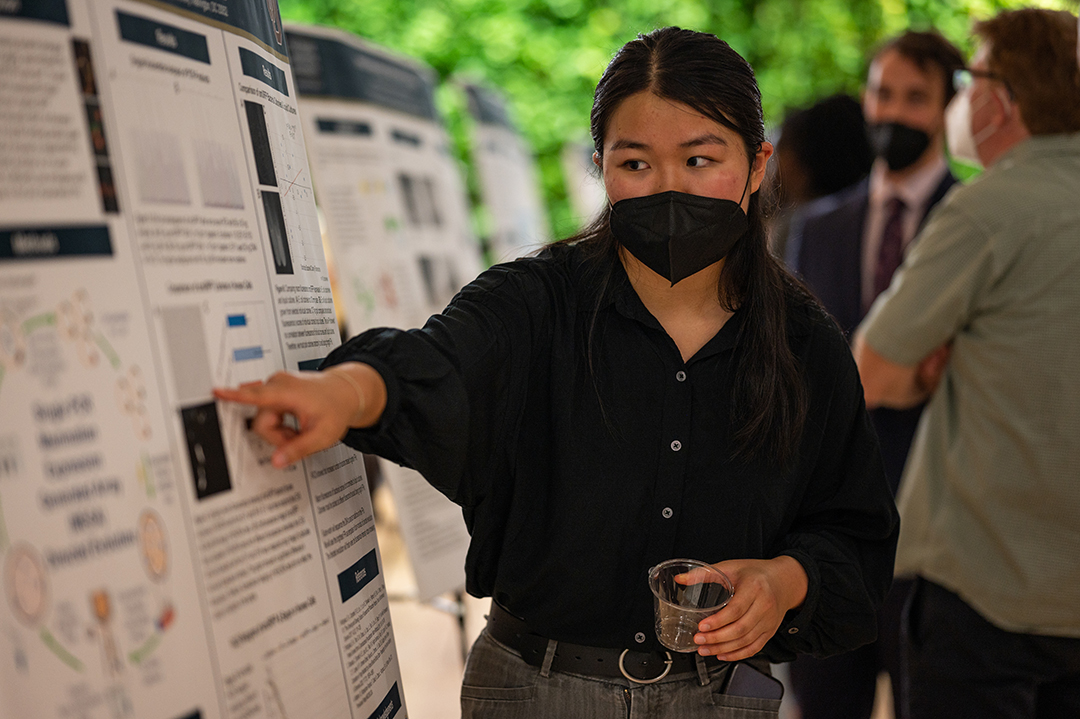16 GW Nursing students presented their work at the university-wide event.
Approximately 400 undergraduate, graduate and professional students across disciplines participated in the annual GW research showcase event coordinated by the Office of the Vice Provost for Research. Categorized by discipline, students presented their work before a panel of judges, vying for honors and special prizes.
The event featured an increase in submissions from students in the Doctor of Nursing Practice (DNP) program. “The number of DNP students engaged in scholarly inquiry has increased significantly,” says Kathleen Griffith, associate dean for research. “Many students used their final quality improvement (QI) projects—it’s nice to see that happen.”
Two DNP students tied for first place in the GW Nursing category—Chibuzo Efuribe, DNP ’22, MSN, RN, FNP-BC, whose research evaluated the effects of a web-based educational intervention for improving depression knowledge and. encouraging help-seeking behavior among women in a faith-based organization, and Keesha Holmes, DNP ’22, FNP, NE-BC, who developed a quality improvement project that educates critical care nurses about ventilator-associated pneumonia (VAP) and VAP bundle interventions.
Efuribe, who graduated last May, became interested in researching depression education through experiences in both her professional and personal life. “In my practice as a primary care nurse practitioner I would always be drawn to patients with mental health conditions, especially depression,” Efuribe says. “I would spend time listening and treating patients, and ensure that they were referred to the right place for continuity of care.”
This work extended beyond the clinic, and during the COVID-19 pandemic Efuribe became a confidante for many friends, family members, and fellow nurses struggling with the symptoms of depression.
She wanted to do more to help sufferers enhance their knowledge of depression and reduce stigma, making it easier to ask for help. More than half of the participants in Efuribe’s study improved in depression knowledge, which was particularly exciting. “The results also revealed that women were more likely to seek help from intimate partners, clergy, and doctors in the order of priority,” Efuribe says. “I didn’t anticipate that at the end of the study, I would recommend basic behavioral health counseling training for clergy.”
Holmes, who also graduated last May, used her experience as a critical care nurse practitioner to develop her QI project. In many hospitals, patients requiring mechanical ventilation are managed in an intensive care unit (ICU) and are susceptible to acquiring VAP if precautionary measures aren’t followed. Holmes recruited 30 medical intensive care unit (MICU) nurses to participate in an educational session about VAP and ventilator care bundle (VCB) interventions, which include head of bed elevation, oral care and aspiration, as well as hand hygiene. “The results did show improvement in the nurses’ documentation on completing VCB interventions,” Holmes says.
“The nurses felt that the education sessions enhanced their knowledge
and tied together the interventions with why they are important to decreasing the incidence of VAP in patients.”
While the research showcase is a low-stakes opportunity (students are only competing against their GW Nursing peers), Efuribe says that presenting her work in this setting gave her a sense of fulfillment and boosted her confidence. She encourages other students to pursue research and presentation opportunities. “You can be good, but if you don’t participate, you’ll never know,” Efuribe says.


